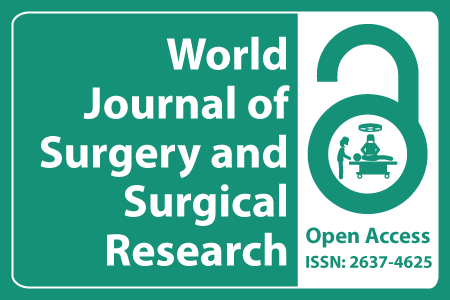
Journal Basic Info
- Impact Factor: 1.989**
- H-Index: 6
- ISSN: 2637-4625
- DOI: 10.25107/2637-4625
Major Scope
- Emergency Surgery
- Gastroenterological Surgery
- Hand Surgery
- Ophthalmology & Eye Surgery
- General Surgery
- Pediatric Surgery
- Cardiovascular Surgery
- Minimal Invasive Surgery
Abstract
Citation: World J Surg Surg Res. 2023;6(1):1496.DOI: 10.25107/2637-4625.1496
Intermittent Remote Ischemia as a Perioperative Protective Factor in Abdominal Surgery
Salazar Islas TL, Arizmendi Villarreal MA, González Villarreal LM, Reyna Sepulveda FJ, Cordero Perez CP, Llaca Díaz EJM, Robles Espino ED, Zapata Salazar HD and Zapata Chavira HA
General Surgery Service, Hospital Universitario Dr. José Eleuterio González, Universidad Autonoma de Nuevo Leon, Mexico
Liver Unit, Hospital Universitario Dr. José Eleuterio González, Universidad Autonoma de Nuevo Leon, Mexico
Department of Pathology, Hospital Universitario Dr. Jose Eleuterio Gonzalez, Universidad Autonoma de Nuevo Leon, Mexico
*Correspondance to: Homero Arturo Zapata Chavira
PDF Full Text Research Article | Open Access
Abstract:
Introduction: Preconditioning therapy with intermittent Remote Ischemia (RII) has been shown to offer benefits in the event of a major ischemic event. Due to these encouraging results, studies have been carried out mainly in animals that demonstrate that conditioning with remote intermittent ischemia promotes angiogenesis and decreases the damage caused by ischemia-reperfusion.
Material and Methods: Longitudinal, prospective, experimental study randomized clinical trial type. All patients over 45 years of age were included, A blood pressure cuff with different time cut- offs was placed in the leg was to mimic RII.
Results: Fifty patients were included, with a mean age of 56.5 ± 12.2 years, 58% were women. Twenty-five patients per group were recruited. We did not find that the use of RII was significantly associated with shorter surgical time, or a lower incidence of intraoperative hypotension, vasopressor requirements, or lower intraoperative lactate levels. At follow-up at 12, 24, and 48 h, there was a greater elevation in blood troponin levels in the control group (5.2 vs. 3.6 ng/ml at 12 h and 5.8 vs. 3.4 ng/ml at 24 h and 8.9 and 5.2 ng/ml at 48 h), however, in the three times, it was not significantly different.
Conclusion: In our study, we did not find an associated benefit of the technique with respect to patient outcomes, quantifiable myocardial injury due to troponins, or 30-day mortality; however, it is possible that the benefit could be found in a cohort with much greater number of patients.
Keywords:
#
Cite the Article:
Salazar Islas TL, Arizmendi Villarreal MA, González Villarreal LM, Reyna Sepulveda FJ, Cordero Perez CP, Llaca Díaz EJM, et al. Intermittent Remote Ischemia as a Perioperative Protective Factor in Abdominal Surgery. World J Surg Surgical Res. 2023; 6: 1496..













